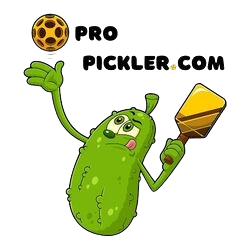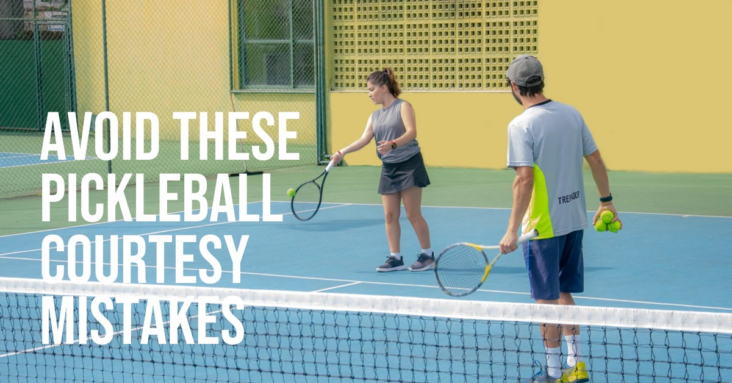In the vibrant world of pickleball, maintaining proper etiquette is essential to ensure a pleasant experience for all players. However, even seasoned players can sometimes overlook certain courtesies, leading to frustration and disruption on the court. Understanding and avoiding these common mistakes can significantly enhance the quality of your games and the overall atmosphere of the sport.
The Importance of Pickleball Etiquette
Pickleball etiquette goes beyond mere politeness; it fosters a respectful and enjoyable environment for everyone involved. By adhering to these unwritten rules, players can ensure that their actions contribute positively to the game, promoting fairness and camaraderie.
11 Courtesy Mistakes Players Should Avoid in Pickleball
1. Not Announcing the Score Loudly Before Serving
Announcing the score clearly before serving is crucial. It ensures that all players are aware of the game’s status and are ready to proceed. This simple act of communication helps avoid confusion and keeps the game flowing smoothly.
2. Walking Across Another Court During Play
Crossing an active court disrupts the ongoing game and can be dangerous. Always wait for a break in play before walking across another court to maintain safety and respect for the players.
3. Not Picking Up Balls That Roll Onto Your Court
If a ball from a neighboring court rolls onto yours, promptly return it without interrupting their game. This small gesture shows consideration for others and helps maintain the flow of play.
4. Holding Multiple Courts
Occupying more than one court when others are waiting is inconsiderate. Respect the community’s access by only using the court you’re actively playing on.
5. Playing Beyond Your Reserved Time
Be mindful of your allotted time on the court. Overstaying your reserved period prevents others from enjoying their fair share of playtime.
6. Offering Unsolicited Advice
While well-intentioned, giving advice without being asked can be unwelcome and perceived as patronizing. Offer tips only when requested to maintain a positive atmosphere.
7. Loud or Disruptive Behavior
Excessive noise and disruptive behavior can distract other players. Maintain a reasonable volume and conduct yourself in a manner that respects everyone’s focus and enjoyment.
8. Ignoring the Lineup for Games
Respect the order of play by adhering to the waiting list or queue. Jumping ahead of others is unfair and disrupts the established system.
10. Hitting the Ball Hard When Returning It
When returning the ball to the opposing team, avoid hitting it with excessive force or making it difficult for them to retrieve. This courtesy ensures a fair and enjoyable game for all participants.
10. Failing to Greet or Acknowledge Other Players
A simple greeting or acknowledgment can go a long way in fostering a welcoming environment. Show respect and friendliness to your fellow players.
Proper Pickleball Etiquette
Pickleball Rotation Etiquette
Rotation systems help manage who plays next, ensuring fair play and a friendly atmosphere. Familiarize yourself with the local system, whether it’s a paddle rack, sign-up sheet, or court queue, and follow it diligently.
- Wait Your Turn: Respect the rotation order and wait for your turn to play.
- Mixed Skill Levels: Be open to playing with and against all skill levels to promote inclusivity.
- Quick Turnaround: Exit the court promptly after your game to allow the next players to start.
- Warm-up Courtesy: Keep warm-ups brief if others are waiting to maximize playtime for everyone.
- Acknowledge Incoming Players: Make your presence known to the current players without intruding.
Public Pickleball Court Etiquette
Public courts require additional consideration to ensure a pleasant environment for all players.
- Wait Your Turn: Wait for a game to finish before entering a busy court.
- Keep Games Timed: Play shorter games during peak times to allow more players access.
- Pick Up After Yourself: Leave the court clean and free of personal items.
- Lower Noise Levels: Be mindful of your volume, especially near residential areas.
- Ball Courtesy: Safely stop play and return balls that roll onto your court.
- Respect Court Rules: Follow any specific rules posted by the facility.
- Share Courts Fairly: Play doubles to maximize the number of players on the court.
- Be Inclusive: Mix and match with players of different skill levels to build community.
Pickleball Waiting Rules
Waiting rules help manage the flow of play and ensure everyone gets a chance to participate.
- Paddle Queue System: Place your paddle in a designated area to indicate your turn to play. Players select paddles in the order they were placed.
- Four-On, Four-Off: After a game, the current players leave the court, allowing the next four in the queue to play. This ensures equal playtime for everyone.
- Winner Stays, Loser Leaves: The winning team remains on the court for an additional game, up to a specific limit, before rotating out.
- Time Limits: Courts may impose game time limits or point limits during peak times to accelerate rotation.
- Ladder Court System: In a “winner moves up the ladder” system, winners move to higher courts, though this may not suit all groups.
Is It Rude to Hit the Ball Hard in Pickleball?
Hitting the ball hard, known as “bangers” or “power plays,” is a legitimate strategy in pickleball. However, context matters:
- Competitive Play: Power shots are expected and anticipated.
- Casual Play: Consistently using power shots against less experienced players can be seen as rude. Moderating your play in casual settings fosters a more enjoyable experience for all.
A Quick Word About Yelling
Vocal expressions like shouting, grunting, and cheering are part of the game. However, excessive noise can distract players and disrupt the game’s flow. In tournament play, loud noises can result in a Technical Warning or Foul, impacting the score.
Enhancing Your Pickleball Experience
Avoiding common courtesy mistakes involves understanding gameplay nuances and interpersonal interactions on the court. Here are additional tips to enhance your experience:
- Clear Communication: Ensure clear communication with opponents and teammates about line calls and scoring disputes.
- Good Sportsmanship: Congratulate opponents on good shots and games, regardless of the outcome.
- Punctuality: Be on time for scheduled games and ready to play when it’s your turn.
- Awareness: Be mindful of your surroundings and avoid excessive celebrations or gestures.
- Encouragement: Offer constructive feedback to new players only when it’s welcome.
FAQ
Q. What is the proper way to announce the score in pickleball?
Announce the score loudly and clearly before serving. This ensures all players are aware of the game’s status and ready to proceed.
Q. How should I handle balls that roll onto my court from another game?
Promptly return the balls to the neighboring court without interrupting their game. This shows consideration and helps maintain the flow of play.
Q. Is it acceptable to offer advice to other players during a game?
Offer advice only when requested. Unsolicited advice can be perceived as patronizing and may disrupt the positive atmosphere.
Q. How can I ensure fair play when using public pickleball courts?
Follow the local rotation system, respect time limits, and share equipment. Be inclusive and considerate of players of all skill levels to promote a friendly environment.
Q. What should I do if I notice someone repeatedly breaking etiquette rules?
Gently remind them of the proper etiquette. Often, a friendly reminder is all it takes to correct the behavior and maintain a respectful atmosphere.
By adhering to these guidelines and avoiding common courtesy mistakes, you can contribute to a positive and enjoyable pickleball experience for everyone involved. For more detailed information on pickleball etiquette, check out our comprehensive guide.



